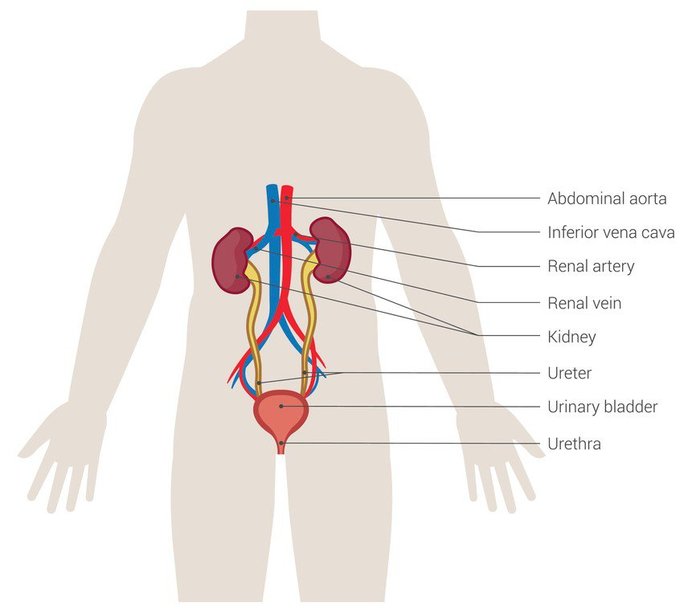If your child has a health condition that affects his or her kidney or another part of the urinary system, you may wish to find out more about these parts of the body.
The urinary system has a very important job to get rid of waste from the body so that we can grow and stay healthy.
The urinary system is made up of two kidneys, two ureters, a bladder and an urethra.

- The kidneys are bean-shaped organs. They filter blood and remove extra water and waste in urine (wee). Most of us have two kidneys. They are at the back on either side of our spine (backbone), near the bottom edge of our ribs.
- The two ureters are long tubes that carry urine from the kidneys to the bladder.
- The bladder is a round, muscular bag that sits low down in the pelvis and stores urine until we are ready to urinate (wee). The bladder fills up with urine like a balloon. When full, it sends signals to the brain which ‘tell’ the bladder muscles to push urine out through the urethra. This is how we pass urine.
- The urethra is a tube that carries urine from the bladder to the outside of the body. We urinate through the opening.
In boys and men, the urethra passes through the penis. It is much longer than in girls and women.
What the kidneys do
The kidneys remove waste from the body – things that we no longer need or that are harmful. They also control the amount of water in the blood, and make sure it has the right balance of chemicals, including salt and acid. They also:
- control blood pressure
- help keep bones and teeth strong and healthy
- control the production of red blood cells, living parts of the blood that carry oxygen round the body.
How waste products are made
Waste is made during metabolism, a set of chemical reactions that are necessary for us to live. In metabolism, a chemical is converted (changed) into another chemical within the body’s cells. Often a waste product is made. For example:
- when we eat, the body converts the food into fuel so we have energy. The liver breaks down protein, which makes the waste product urea.
- when we use our muscles, the body breaks down a chemical. This makes the waste product creatinine.
These waste products move round the body in the bloodstream. When blood enters the kidney, it goes into the glomerulus, where it is filtered. The waste is safely removed in urine.
Medical terms about the urinary system
You may hear or read lots of words related to the kidneys and other parts of the urinary system.
Renal
- Renal means anything related to the kidney.
- A paediatric renal unit of a hospital is where children with kidney problems are treated.
Nephrology
- Nephrology is the medical specialty of kidney diseases.
- Nephrologists are specialist doctors who treat people with kidney problems.
- If they work especially with babies, children and young people, they are called paediatric nephrologists.
Urology
- Urology is the surgical specialty of the urinary system.
- Urologists are specialist surgeons who treat people with problems in their urinary system.
- If they work especially with babies, children and young people, they are called paediatric urologists.
Urologists and nephrologists often work together.
Other doctors
- Other doctors, including general practitioners (GPs – family doctors), and general paediatricians (children’s doctors), will be able to treat some kidney conditions in children.